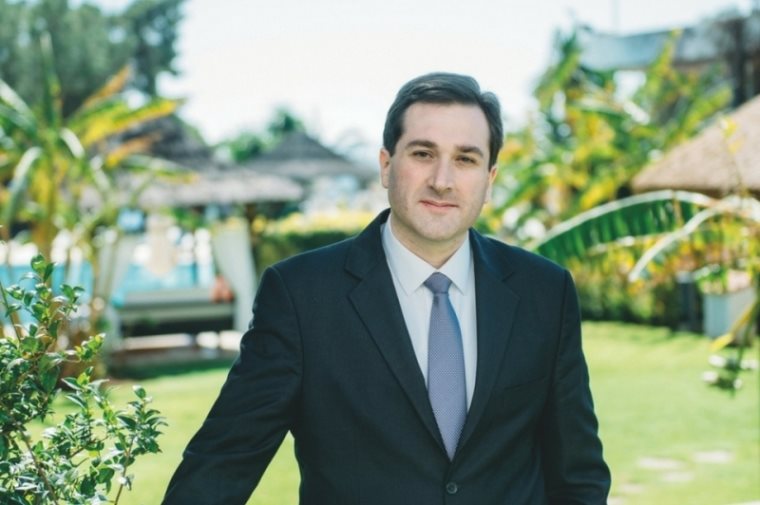According to the forecast released by the World Tourism Organization (UNWTO), globally, the number of international tourists will continue to grow steadily for the next 15 years, although at a slower pace. For instance, if the growth rate in 2016 was 4 percent, in 15 years it will be only 2.5 percent. According to the same forecast, the annual volume of international tourism will grow by 48 million people on average and by 2030 it will reach 1.8 billion. The growth rate among developing countries will be twice that of developed countries.
Asia and Oceania will be the regional leaders in terms of attracting new visitors. Asia will also become the fastest growing region with regard to outbound tourism.
To learn more about the role tourism plays in the world’s economy, the existing challenges and Georgia’s competitive advantage on the world tourism map, we spoke with Officer of the Regional Program for Europe of the World Tourism Organization Network Beka Jakeli
Georgia recorded some very encouraging tourism indicators in the first half of 2017 –43% growth in the number of tourists and a nearly 14% increase in the number of international travellers.
Such an increase in the number of tourists travelling to Georgia is good news. Georgia’s growing tourism sector is systematically reflected in our international reports that are closely followed by the business circles of various countries of the world. International tourism had quite a good start in 2017. The number of international visitors from January through April increased by 6% compared to the same period last year. However, talking only based on numbers would not be interesting without analysing the ongoing events. Approximately 15 years ago the governments of various countries did not fully appreciate the importance of the tourism sector for the economy of the country. Neither did they react to the massive influx of tourists until they saw the revenue received from tourism, which was enough to change their approach to the sector. The following trends are particularly noteworthy:
As a result of the rapid market growth and demand, the tourism sector started receiving more encouragement in a number of countries. Mandatory and rather harsh regulations have gradually been replaced by voluntary, incentive-based policies.
Many countries realized that strict visa policies create unnecessary bureaucratic barriers and thus, significantly reduce the number of potential visitors along with foreign currency inflow. The modern world is actively contemplating ways to streamline such travel-related formalities.
In my opinion, the most important thing is that the largest exporters of oil and gas are now viewing tourism as one of the top priority sectors for their economies, which indicates that the revenue derived from this sector is very high.
The Arab states in the Persian Gulf, like Saudi Arabia, Kuwait, the United Arab Emirates and Qatar, are discussing the role of tourism in creating job opportunities and attracting foreign currency. Another good example of this is the forecast made by the World Travel & Tourism Council (WTTC), which suggests that the share (direct and indirect) of the tourism sector in GDP of Azerbaijan will be 20.6 percent, (one-fifth of the total economy). According to the same forecast, Georgia’s indicator is also quite impressive – 35.5 percent, but the difference is that Azerbaijan’s main export industry is oil and gas.
Such interest in tourism on the part of the world’s largest oil-producing nations will most likely change the world market conditions.
What are the main trends and characteristics of international tourism that were prompted by the progress achieved in the sphere of information technology?
Progress in mobile technology and the rapid development of the aviation sector has led to major qualitative changes of the market. The assumption that retired people are the most stable tourists because they have more free time and financial savings is no longer valid due to the growing number of young travellers. Gone are the days when people only chose certain resorts for travel due to their popularity. The majority of international tourists prefer to visit new unexplored places. Europe maintains the leading position on the world map. There is an increasing demand for visiting Eastern European states, including Georgia. At the same time, competition within the tourism and hotel industry hit historical highs, forcing even transnational corporations to spare no effort in order to maintain their position on the market. For instance, low-cost airline companies lured away customers from larger airlines, especially the segment that travels to European cities on weekends. In the past eight years, Airbnb has become a major player on the global market. Those who used to stay at hotels are now choosing to stay at comfortable apartments that cost in the region of €50-60, which is much less than a hotel room.
The United Nations declared 2017 as the International Year of Sustainable Tourism for Development. What prompted this decision and why is it so important?
The sustainable development of tourism means that by implementing an appropriate and integrated policy, a country enjoy long-term economic profit on a national, regional and local level. Based on the analysis of international trends, we can safely say that sustainable development of tourism reduces the scale of migration from high mountainous regions. It also promotes the growth of local agricultural products and reduces the import of products. While the influx of tourists increases, the state tends to take better care of its cultural heritage and prevents the pollution and depletion of natural curative resources in order to avert any type of ecological threat.
On September 25, 2015, the 193-Member United Nations General Assembly formally adoptedthe 2030 Agenda for Sustainable Development, which is comprised of 17 goals and 169 targets. It should be noted that tourism is mentioned in terms of a strategic sector in three goals.
For example, Goal 8:“Promote sustained, inclusive and sustainable economic growth, full and productive employment and decent work for all.”Goal 12:“Ensure sustainable consumption and production patterns.“Goal 14:“Conserve and sustainably use the oceans, seas and marine resources for sustainable development.”
The above underscores the importance of tourism as a universal sector contributing to the further development of our planet.
The Paris climate agreement within the United Nations Framework Convention on Climate Change (UNFCCC) adopted on December 12, 2015, in Paris also plays an important role in the sustainable development of tourism. It is my firm belief that climate change represents the main long-term challenge for the development of the tourism sector.
It should also be mentioned that the National Tourism Administration of Georgia is a partner and one of the sponsorsof the International Year of Sustainable Tourism for Development 2017.
While we are talking about challenges, I would like to mention another topic – tourism and terrorism. Recently, there has been an increasing number of terrorist acts in among developed, large tourist cities. How does it affect tourist inflow?
Terrorism poses a serious challenge for international tourism. The terrorist acts that took place in various cities of the world have instilled fear that there is no safe place on the planet for vacationing. The increased scale of terrorist activities has even led to a decrease in tourists to Western Europe. Germany had a 2% increase in international tourism mainly due to business and professional travellers. A number of tourist destinations saw decreases. For example, France saw a 4 percent decrease in foreign tourists due to the terrorist attacks in Paris and Nice and Belgium saw a 13 percent decrease in the number of tourists as a result of the aftermath of the terrorist act in Brussels. The increased number of terrorist attacks in Cairo and other Egyptian cities led to a 42 percent decrease in tourists to Egypt. The massive uprisings, civil unrest and terrorist acts that took place in Istanbul and other cities of turkey have entirely changed the perception of the country as a safe tourist destination and significantly reduced hotel occupancy rate there.Promoting safe, seamless and friendly travel is among the top three priorities cited by the UNWTO for 2017.However, it should also be noted that tightening security measures should not necessarily lead to tightening visa policies as well. On the contrary, travel-related formalities should be further simplified.
Let’s shift attention to Georgia – the marketing campaign conducted by the Georgian National Tourism Administration is often criticized by the private sector. For six years Georgia has acted as the UNWTO Regional Program Coordinator in Europe. Therefore, I would like to know what types of marketing campaigns are being initiated across the world today? Based on which criteria do countries choose markets and what would be your recommendations for Georgia?
TV marketing is losing relevance along with the development of mobile technologies. Today most countries actively employ digital marketing. The main criteria used for choosing markets is the stability of a country’s economy. If the desired market is characterized by economic recession, there is no point in investing in the popularization of the country. There are also other factors that need to be examined. Does the population of the desired country have a high income? Are there direct flight to the country? What is the profile of the visitors? At the moment, China is considered the biggest market for the majority of the European countries. In view of the high-income population, I think that Georgia should focus its marketing campaign in Europe –places like Germany, Great Britain, France and Italy, as well as Asia, in countries like China, Japan and South Korea. And of course the Americas, including the United States, Canada and Latin America. At the same time, Georgia should continue its marketing campaign in neighbouring countries, Eastern Europe and the Middle East. My recommendation would be to plan marketing campaigns for particular segments of consumers according to specific markets. For instance, Georgia for newlyweds, for various segments of young travellers, for families, for retired people and so on.
Also very important is the introduction of budget airlines. For a long time now, Georgian tour operators along with their partners have been selling tour packages to the South Caucasus. This direction needs further stimulus. Today Turkey has lots of cultural tourists from China, Japan, South Korea, North and Latin America. Therefore, it is very important to engage the Turkish airline companies in attracting tourists from faraway countries. The guiding principle should be as follows: Turkey + South Caucasus as a single tourism product.
What is your assessment of the project ‘Check in Georgia’, which received 20 million laris from the state budget? Are these kinds of projects commonly used for attracting tourists in developing countries and in which cases are such projects worthwhile?
International, cultural and sporting events are widely used to attract tourists in the modern world. Such events are usually non-seasonal or all year-round and are held in various cities and tourist destinations. International practice shows that cultural events are funded by the state when certain tourist destinations are unknown and the state aims to attract foreign tourists, as well as draw the attention of business circles. In developing countries, it is more common for the state and private sector to cooperate in organizing such events, while in countries with developed economies, cultural events are entirely financed by the private sector. In my opinion, state financed/co-financed sporting and cultural events are financially justifiable when every $1 USD spent on organizing the event yields $10 USD as a direct or indirect expenditure by foreign tourists. Direct expenditure is money spent on buying the tickets to attend the event, while indirect expenditure indicates all international and domestic travel, accommodation, food and other related expenses.
One of the goals of the UNWTO is to support member states in developing effective national systems for tourism statistics and Georgia is engaged in this process. Could you explain what role Georgia plays in this and also, what type of classification suggested by the UNWTO should we apply for counting tourists and tourist expenditure?
Since 2011 Georgia has been a member and elected vice-president (till 2019) of the UNWTO Statistics and Tourism Satellite Account Committee. An effective system for keeping statistical data in the sphere of tourism is essential for making an accurate evaluation of the impact of the tourism sector on the economy of the country, to determine the appropriate plan of action for developing this sphere and providing investors with credible and comprehensive information. An effective system for keeping statistical data requires close cooperation between the National Statistics Offices, the National Bank and the National Tourism Association of Georgia. The UNWTO developed a Tourism Satellite Account system for determining the exact impact of this sector on the economy. The system is composed of ten tables that cover the following information: inbound and outbound tourism expenditure, gross production in the sphere of tourism, the impact of tourism on employment and so on.
How do various countries estimate expenditure?
In Schengen countries, data on tourist spending is obtained from hotels and other places of accommodation. In the post-soviet states, they still use customs declarations and other information indicated in the immigration form, which is rather out-of-date methodology. Approximately 15 years ago, the UNWTO developed a methodology for conducting a border survey. This is a questionnaire that is filled out by tourists on a voluntary basis upon departure from the country, and it covers questions such as the aim of the trip, expenditure and so on. Georgia introduced this method in 2006.
During his last visit to Georgia, the UNWTO Secretary General Taleb Rifai said in an interview that every country must possess something that people associate it with – something that will be remembered when they close your eyes. Georgia does not possess that yet. What should Georgia be associated with in your opinion?
Almost all developing countries offer consumers authentic environments with rich historic and cultural monuments, untouched landscapes, unique cuisine and wine, etc. The question is: what can Georgia offer that will make it stand out from other countries? I believe that the focus should be made on people, lifestyle, national cuisine and the cradle of wine. In other words, the main message should be that the tourists will not only see all these things, but they will be able to personally experience the feast together with the local population and spend an unforgettable time in our country.
Key numbers:
- According to the UNWTO, the number of international tourists in 2016 increased by 4 percent globally, reaching a total of 1.2 billion. In other words, every seventh inhabitant of the planet crosses an international border and makes a contribution to the economy of a particular country.
- Six European countries are among the top ten most visited countries. These include France, Spain, Italy, Turkey, Germany and Great Britain.
- The United States ranks first in terms of revenue derived from tourism totalling $207 billion in 2016.
- China holds the leading position in outbound tourist expenditure. In 2016, Chinese tourists spent a grand total of $261 million.
- Due to economic problems and the devaluation of the Russian ruble, there was a significant reduction in the number of outbound tourists from Russia. As a result, expenditure decreased by 31 percent.















